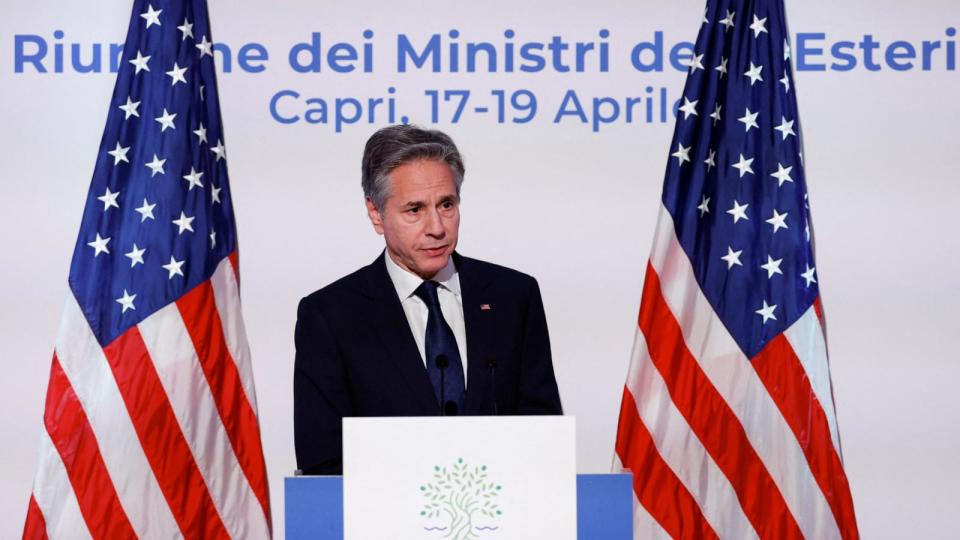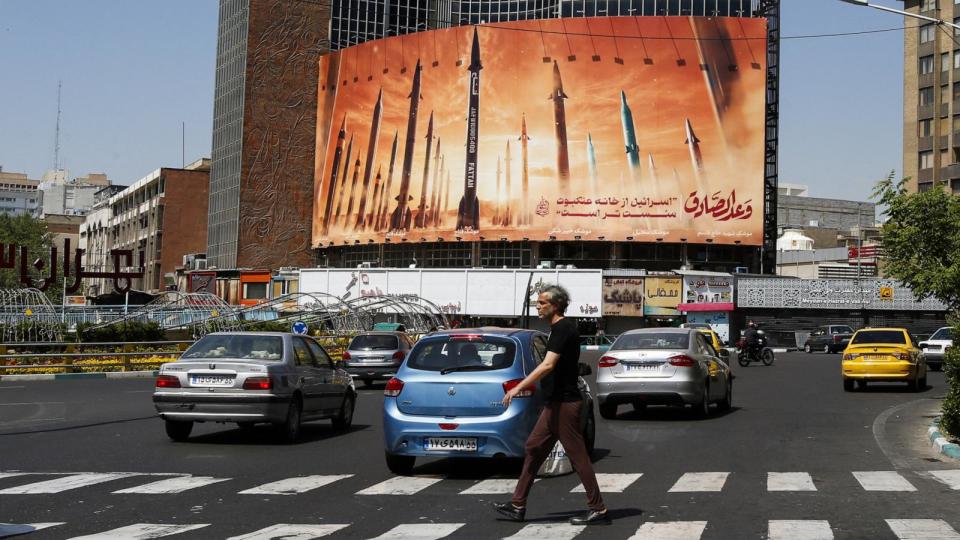Nothing to see here: US, Israel go radio silent on strike against Iran
Hours after a senior U.S. official told ABC News that Israeli fighter aircraft struck an air defense radar site inside Iran, top U.S. and Israeli officials on Friday declined to publicly acknowledge the incident in an apparent move aimed at de-escalating the situation and keeping Iran from retaliating.
The radio silence was notable after weeks of U.S. officials publicly urging Israel to show restraint.
At the end of a G7 foreign ministers meeting in Capri, Italy, Secretary of State Antony Blinken was asked why he wouldn't address what happened overnight.
The reporter also asked, "Isn’t it important that you do so? Can you tell us if you’ve spoken to your Israeli counterparts?"
Blinken replied, "I'm going to be incredibly boring and not make your day by saying, again, I'm not going to speak to what's been reported -- other than to say that the United States has not been involved in any offensive operations."
"The United States, along with our partners, will continue to work for de-escalation," he added.

But even as Blinken defelcted, Italian Foreign Minister Antonio Tajani seemed reveal that Israel gave the US a heads up before the strike.
“They were – [the] United States -- were informed the last minute, but there was no involvement on the part of the United States it was simply information which was provided,” Tajani said.
According to a senior U.S. official, three missiles were fired early Thursday local time from Israeli fighter aircraft outside of Iran. The target was an air defense radar site near Isfaha that helps to protect a nearby nuclear facility.
The limited strike was believed to show Iran that Israel has the ability to cause real damage, but at the same time not provoke Iran.
Iran called the Israeli strike a dramatic exaggeration by the media. In a meeting at the United Nations, Iranian Foreign Minister Amir Abdollahian said "the downed micro-aerial vehicle did not cause any financial or life damage."
The International Atomic Energy Agency confirmed not damage was done to the Natanz nuclear facility.
Shuki Friedman of the Jewish People Policy Institute, a former head of the Iran sanctions program for the Israeli prime minister's office, likened the strike to Israel sending Iran a "text message."
"Israel sent the message that 'we can reach anywhere,'" and to "demonstrate capabilities of a much more meaningful attack," Friedman said.

Mick Mulroy, a former deputy secretary of defense for the Middle East and an ABC News national security and defense contributor, agreed the attack was carefully calibrated.
"I believe the Israeli's are determined to show Iran that it could target a sensitive facility in Iran, but did so in a manner not to provoke a response," he said
"They also with the notable exception of their national security minister chose not to publicly discuss (the incident) as that would of been counterproductive to trying to contain and deescalate the situation," Mulroy added.
The U.S. appeared to be doing the same.
At the Pentagon, aides on Thursday were teleworking or declared themselves busy with no plans to brief reporters. The State Department, too, was quiet.
Such a slow pace can be typical in Washington for a Friday, as staffers eye the exits for an early weekend.
But the quiet hallways were noteworthy, given that a close U.S. ally had just launched a direct attack on Iran and no comment was to be found.
At the White House, National Security Council spokesman John Kirby, who briefed reporters at length throughout the week, was not at the podium for the daily press briefing.
When pressed by reporters about whether declining comment was part of an administration strategy to de-escalate, White House press secretary Karine Jean-Pierre would say she was going to be “super mindful” in her remarks.
“I understand the interest and I'm going to be disappointing many people here. This afternoon, I just don't have anything to share,” she said.
She added that “more generally,” the U.S. has been clear “we do not want to see this conflict escalate.”
One U.S. official who declined to discuss any detailed offered this assessment of the unusual silence so long as they were granted anonymity: "In the end, we're trying to stop a war here."
ABC's Matt Gutman contributed to this report.
Nothing to see here: US, Israel go radio silent on strike against Iran originally appeared on abcnews.go.com


